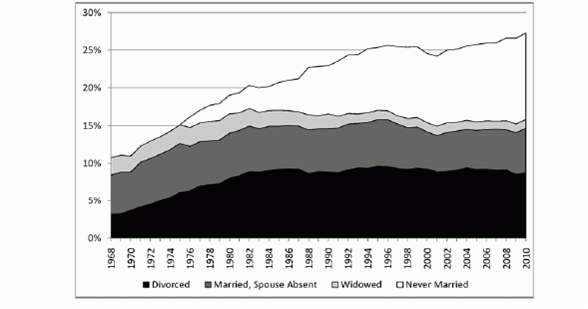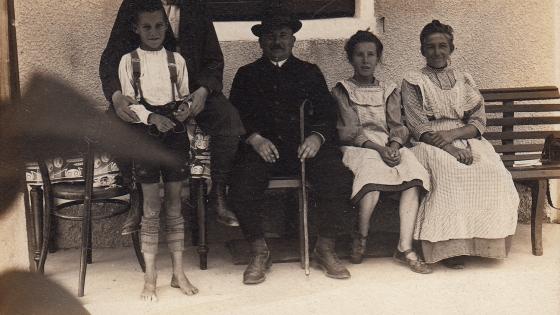Disparities between Blacks and Whites are a persistent feature of American society. These disparities are continuing reminders of America's troubled history of racial discrimination. Some 40 years after the Civil Rights Movement, the economic and social progress of a large segment of African Americans has been painfully slow.
Black males earn 25% less than White males. The corresponding figure for females is 17% (see Table 1, “raw” columns). This pattern of disparity is replicated in many other measures of social and economic achievement: schooling, health, incarceration, occupational success (Fryer 2010).
Nonetheless, there is great wisdom in the insight of William Julius Wilson (2009) that the first order problems facing African Americans in contemporary society are shared by many other groups. The shortfalls in achievement in the 21st century stem from shortfalls in skills.
When adult wages are adjusted by scores on scholastic ability tests measured in the teenage years, the gaps substantially diminish for Black males and are essentially zero for Hispanic males. The gaps actually reverse for females – that is, adjusting for their ability, minority females earn more than their White counterparts (see the columns labelled “adjusted” in Table 1). Inequality in skills is the first order problem.
Table 1. Shortfalls in hourly wages by age for Blacks and Hispanics in the last 20 years: Actual disparity and adjusted for ability
| |
Males |
Females |
| |
Raw |
Adjusted |
Raw |
Adjusted |
| Black |
-25% |
-6% |
-17% |
12% |
| Hispanic |
-15% |
3%1 |
-7% |
17% |
Note: 1 Denotes not statistically significant from zero, i.e. adjusted gap is likely to arise from chance.
Soure: Authors' calculations from the National Longitudinal Survey of Youth. For details, see web appendix.
What’s more, there is evidence that disadvantaged children of all race groups have lower levels of soft skills, i.e. motivation, sociability, attention, self regulation, self-esteem, the ability to defer gratification etc. (Carneiro and Heckman 2003). These skills are as predictive, if not more predictive, of schooling, wages, and crime.
America is not yet a colour blind society. Still, any serious accounting of economic and social disparities must reckon with the importance of skills in US society.
Rethinking our strategies for promoting skills
Many of the programmes and policies designed to boost skills that were launched in the 1960s War on Poverty failed. However, people continue to advocate many of these unsuccessful approaches, especially those most concerned about closing racial gaps. Just as we need to rethink the sources of racial inequality in contemporary American society, we need to rethink our strategies for promoting skills.
Public policy to promote skills has to reckon with three essential truths distilled from a large body of research conducted in the wake of the War on Poverty.
- First, the skills needed for success in life are many. Success requires more than just being smart. Soft skills are important. Conscientiousness, perseverance, sociability, and other character traits matter a lot, even though they are largely neglected in devising policies to reduce inequality.
- Second, skill formation is a dynamic, synergistic process. Skills beget skills. They foster and promote each other. A perseverant child open to experience learns more. Early success fosters later success. Advantages cumulate. Young children are flexible and adaptable in ways that adolescents and adults are not. It is much easier to prevent deficits from arising in the early years than to remediate them later.
- Third, families play an essential role in shaping the skills of their children. Skill formation starts in the womb. The early years of a child’s life before the child enters school lay the foundation for all that follows. Large gaps in abilities between the advantaged and the disadvantaged open up early – before children enter school.
The American family under strain
Across all race and ethnic groups, the American family is under strain. Currently, over 40% of all American children are born out of wedlock and more than 12% of all children live in families where the mother has never married (Figure 1). Such families provide fewer financial and parenting resources for child development. It is well documented that the children of lone parent families perform worse in life on many outcomes (McLanahan 2004). Many American children across all races and ethnicities are in the same sinking boat. Any effective policy to foster skills has to recognise the importance of the family, the mechanisms through which families create child skills, and the stress under which many families operate.
Figure 1. Share of children under 18 living with one parent, by marital status of the parent
How to best aid struggling families
While we do not yet know all of the mechanisms through which families influence their children, we know enough to suggest the broad contours of an effective child development strategy. Supplementing the early years of disadvantaged children addresses a major source of inequality.
An example is the Perry preschool programme that targeted disadvantaged, subnormal IQ African American preschoolers just outside Detroit. For two years, the programme taught children to plan, execute, and evaluate daily projects in a structured setting. It fostered social skills. There were weekly home visits to encourage parenting. The Perry programme was evaluated using random assignment with long-term follow-up for 40 years. Rates of return are 7%-10% per annum – higher than the return on equity over the post-war period 1945-2008 and before the recent market meltdown (Heckman et al. 2010).
Dynamic synergies and the timing of effective interventions
These and other successful child development programmes work because they start early. Benefits include enhanced school readiness, and reduced burdens on the schools for special education. They produce benefits in the teen years with better health behaviours, reduced teenage pregnancy, and lower dropout rates. They promote higher adult productivity and self-sufficiency. High quality early childhood programmes are investments with rates of returns far higher than those found for most governmentally provided skills programmes. The return to investment at the earliest ages is high because it creates the foundation of skills that make later investment productive. This pattern is a manifestation of dynamic synergism – what economists call “dynamic complementarity.”
Current policy over-invests in attempting to remediate the problems of disadvantaged adolescents and under-invests in the early years of disadvantaged children. In contrast to the 7%-10% per annum earned by the Perry programme and other early childhood programmes, returns on many other skill enhancement programmes are much lower. They are certainly lower for public job training, criminal rehabilitation programmes, adult literacy programmes, and a variety of other later life remediation programmes targeting disadvantaged adolescents and young adults with low cognitive and character skills.
We need to listen to the logic of developmental biology to devise strategies to reduce disparities in parenting across all racial and ethnic groups.
Engage the private sector
How can we fund such programmes? Times are hard and government budgets are strained. Nonetheless, it is still possible to fund effective new programmes if we replace the numerous ineffective programmes currently in place. Also, engaging the private sector –philanthropic, community and religious organisations – could bolster the resource base supporting early childhood. Bringing in diverse partners encourages experimentation with new approaches that build on the success of templates like Perry programme. Educare is one promising programme that fosters public and private partnerships.
A new strategy based on new knowledge
Modern society is based on skills, and inequality in achievement across all race and ethnic groups is primarily due to inequality in skills. Our current policies to reduce achievement gaps ignore these simple truths. A comprehensive, cost-effective policy to enhance the skills of disadvantaged children of all racial and ethnic backgrounds through voluntary, culturally sensitive support for parenting is a politically and economically palatable strategy.
References
Carneiro, Pedro and James J Heckman (2003), "Human Capital Policy", in James J Heckman, Alan B Krueger, and Benjamin M Friedman (eds.),Inequality in America: What Role for Human Capital Policies?, MIT Press.
Fryer, Roland (2010), "Racial Inequality in the 21st Century: The Declining Significance of Discrimination", (Forthcoming in the Handbook of Labor Economics, Volume 4).
Heckman, James J, Seong Hyeok Moon, Rodrigo Pinto, Peter A Savelyev and Adam Q Yavitz (2010), "The Rate of Return to the Highscope Perry Preschool Program", Journal of Public Economics, 94(1-2).
McLanahan, Sara (2004), "Diverging Destinies: How Children Are Faring under the Second Demographic Transition", Demography, 41 (4).
Wilson, William J (2009), “More Than Just Race: Being Black and Poor in the Inner City”, W W Norton & Company.



